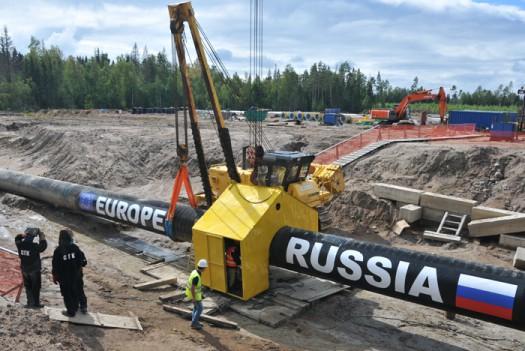
RUSSIAN - GERMAN NORD STREAM

Germany's Minister of Finance, Sigmar Gabriel (SPD), has aligned himself with Vladimir Putin on the Nord Stream gas-pipeline expansion issue.
A transcript of a meeting last month between Gabriel, and the Russian Premier, Vladimir Putin, has been published by the Kremlin. It concerns the planned expansion of the Nord Stream Baltic Sea gas-pipeline.
According to the report, Gabriel explained that he would ensure that construction of the pipeline would remain legal in the eyes of the German authorities. Gabriel also made it clear that Brussels should have limited involvement with the project.
In September, Russian energy giant Gazprom and European energy providers such as Eon, BASF and Shell signed an agreement on construction of the Nord Stream 2 project. Two parts of the pipeline should be completed by 2019. The new pipeline, which could potentially transport 55 billion cubic metres of gas per year, would double the capacity of Nord Stream.
On Wednesday (18 November), the European Commission will submit a report at the EU's Energy Union.
Brussels sceptical
Maroš Šefčovič, the Commission's Vice-President for Energy Union, will present a report about the project, which is intended to bring the 28 member states closer together in terms of climate and supply policy. The draft of Šefčovič's report states that the European Commission wants to closely scrutinise whether the Nord Stream 2 plan would comply with EU regulations.
Despite Šefčovič's misgivings, it will be difficult for the executive to overturn the project, as it would have to find a legal approach that would allow it to influence national authorisation procedures. A task that observers say is unlikely to happen.
Brussels' scepticism about the pipeline expansion has a geopolitical basis. The European institutions are wary that the project would increase the continent's dependence on Russian gas imports. As early as last spring, Šefčovič submitted a strategy that urged Europe to look for alternatives to importing gas.
The view from Brussels is also that the pipeline expansion would diminish Ukraine's role as a transit country. This is a fact that Gabriel is fully aware of, having mentioned the need to preserve Ukraine's role post-2019, during his last visit to Moscow.
While Gabriel strongly supports the project, the issue is divisive, with many of his own party-colleagues in Brussels critical because of the powerful position of Gazprom. "We are in a mutually dependent relationship with Russia," said Martina Werner. The SPD's energy policy spokesperson in the European Parliament is not convinced that "only Gazprom with benefit from the situation". Stronger criticism of the pipeline has come from the conservative side of the Parliament. The head of the CDU/CSU group, Herbert Reul, warmly received the Commission's decision to examine the legality of the project, adding his voice to the concerns that it would lead to increased dependency.
It seems that the main detractors of the project in Brussels come from Europe's east. They include Jerzy Buzek, the former Prime Minister of Poland who is now the chair of the Parliament's Committee on Industry, Research and Energy. Last week, Buzek voiced the Committee's concerns about cooperating with Gazprom to Šefčovič.
Buzek wrote that the Nord Stream project is incompatible with the "core issues" of EU energy policy, particularly the identification of diverse energy providers. Šefčovič should make it clear when he presents his report that the project would be ineligible for European funding, Buzek added.
Merkel holds the cards
Buzek's compatriot Donald Tusk has also, in the past, called for reduced dependency on Russian gas. Tusk has been President of the European Council for almost a year now and has built a strong position for himself in Brussels. The Pole is responsible for inviting European and world leaders to regular summits and also sets the agendas for the meetings.
Energy expert Claude Turmes, of the European Greens, has called upon Tusk to put the issue on the agenda of the next meeting with Angela Merkel and her counterparts, next month.
Turmes believes that the Chancellor is "more sceptical" about Nord Stream than her deputy, Gabriel. In any case, Merkel is no fool and does not underestimate the importance of Russian business for the German economy. In March 2014, at the high point of the Crimea-crisis, Merkel met with the four largest business associations in Munich, for top-level talks about trade between Germany and Russia.
-----
More:





